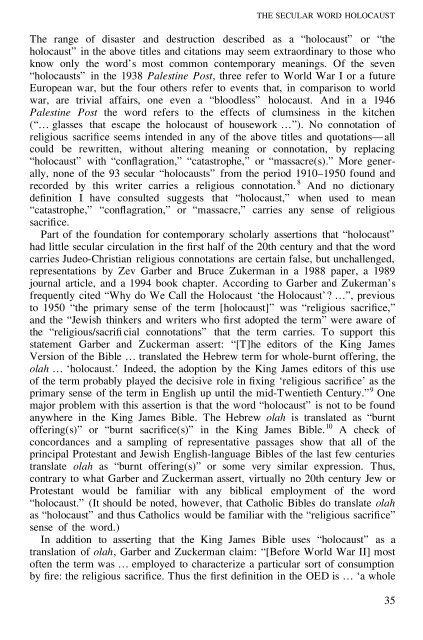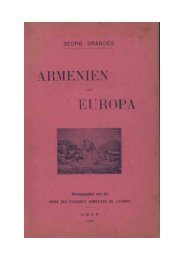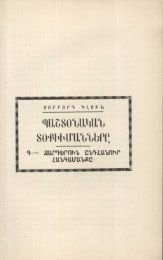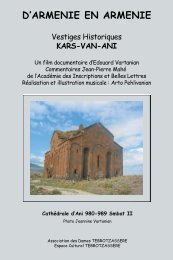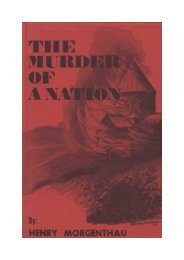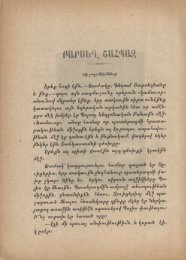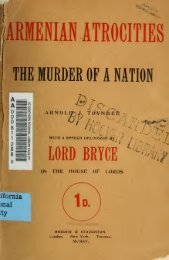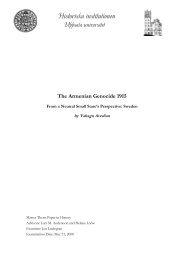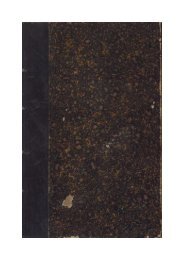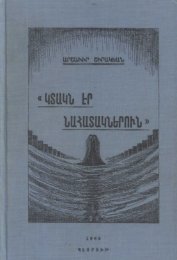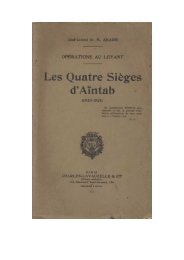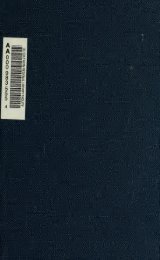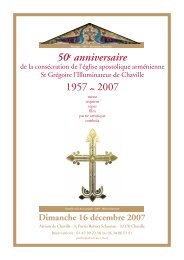The secular word HOLOCAUST: scholarly myths, history, and 20th ...
The secular word HOLOCAUST: scholarly myths, history, and 20th ...
The secular word HOLOCAUST: scholarly myths, history, and 20th ...
Create successful ePaper yourself
Turn your PDF publications into a flip-book with our unique Google optimized e-Paper software.
THE SECULAR WORD <strong>HOLOCAUST</strong><strong>The</strong> range of disaster <strong>and</strong> destruction described as a “holocaust” or “theholocaust” in the above titles <strong>and</strong> citations may seem extraordinary to those whoknow only the <strong>word</strong>’s most common contemporary meanings. Of the seven“holocausts” in the 1938 Palestine Post, three refer to World War I or a futureEuropean war, but the four others refer to events that, in comparison to worldwar, are trivial affairs, one even a “bloodless” holocaust. And in a 1946Palestine Post the <strong>word</strong> refers to the effects of clumsiness in the kitchen(“… glasses that escape the holocaust of housework …”). No connotation ofreligious sacri ce seems intended in any of the above titles <strong>and</strong> quotations— allcould be rewritten, without altering meaning or connotation, by replacing“holocaust” with “con agration,” “catastrophe,” or “massacre(s).” More generally,none of the 93 <strong>secular</strong> “holocausts” from the period 1910–1950 found <strong>and</strong>recorded by this writer carries a religious connotation. 8 And no dictionaryde nition I have consulted suggests that “holocaust,” when used to mean“catastrophe,” “con agration,” or “massacre,” carries any sense of religioussacri ce.Part of the foundation for contemporary <strong>scholarly</strong> assertions that “holocaust”had little <strong>secular</strong> circulation in the rst half of the <strong>20th</strong> century <strong>and</strong> that the <strong>word</strong>carries Judeo-Christian religious connotations are certain false, but unchallenged,representations by Zev Garber <strong>and</strong> Bruce Zukerman in a 1988 paper, a 1989journal article, <strong>and</strong> a 1994 book chapter. According to Garber <strong>and</strong> Zukerman’sfrequently cited “Why do We Call the Holocaust ‘the Holocaust’? …”, previousto 1950 “the primary sense of the term [holocaust]” was “religious sacri ce,”<strong>and</strong> the “Jewish thinkers <strong>and</strong> writers who rst adopted the term” were aware ofthe “religious/sacri cial connotations” that the term carries. To support thisstatement Garber <strong>and</strong> Zuckerman assert: “[T]he editors of the King JamesVersion of the Bible … translated the Hebrew term for whole-burnt offering, theolah … ‘holocaust.’ Indeed, the adoption by the King James editors of this useof the term probably played the decisive role in xing ‘religious sacri ce’ as theprimary sense of the term in English up until the mid-Twentieth Century.” 9 Onemajor problem with this assertion is that the <strong>word</strong> “holocaust” is not to be foundanywhere in the King James Bible. <strong>The</strong> Hebrew olah is translated as “burntoffering(s)” or “burnt sacri ce(s)” in the King James Bible. 10 A check ofconcordances <strong>and</strong> a sampling of representative passages show that all of theprincipal Protestant <strong>and</strong> Jewish English-language Bibles of the last few centuriestranslate olah as “burnt offering(s)” or some very similar expression. Thus,contrary to what Garber <strong>and</strong> Zuckerman assert, virtually no <strong>20th</strong> century Jew orProtestant would be familiar with any biblical employment of the <strong>word</strong>“holocaust.” (It should be noted, however, that Catholic Bibles do translate olahas “holocaust” <strong>and</strong> thus Catholics would be familiar with the “religious sacri ce”sense of the <strong>word</strong>.)In addition to asserting that the King James Bible uses “holocaust” as atranslation of olah, Garber <strong>and</strong> Zuckerman claim: “[Before World War II] mostoften the term was … employed to characterize a particular sort of consumptionby re: the religious sacri ce. Thus the rst de nition in the OED is … ‘a whole35


